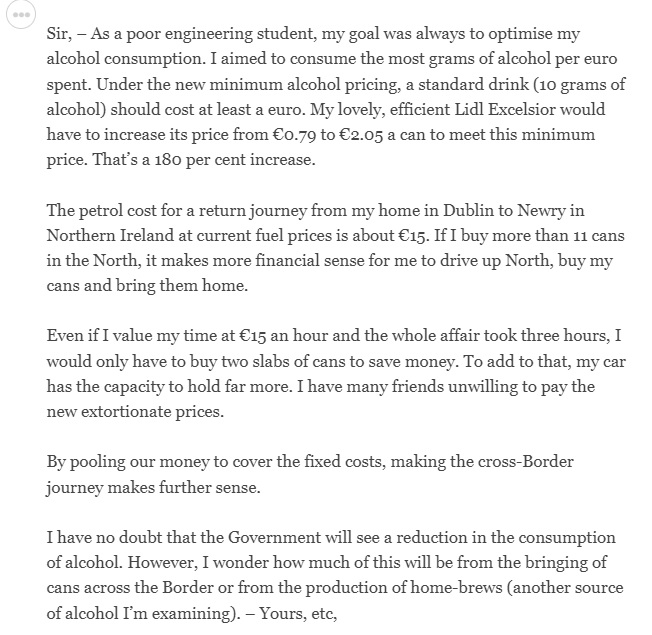Visit The Pub Curmudgeon site

From Tuesday January 4th, the Republic of Ireland followed in the footsteps of Scotland and Wales by introducing a Minimum Unit Price (MUP) for alcohol. There is some confusion about the actual level, as the headline rate is set at Ōé¼1 per ŌĆ£standard drinkŌĆØ. This is defined in weight terms as containing 10 grams of pure alcohol, but as alcohol is lighter than water it corresponds to a volume of 12.5 millilitres. At the current exchange rate this equates to a price of about 67p per unit as understood in the UK, which is a third as much again as the 50p rate applying in Scotland and Wales.
While the 50p level leaves many popular products untouched, 67p will affect a large swathe of mainstream drinks and leave only high-priced premium products unscathed. A 4x440ml pack of Carling will be ┬Ż4.72, a bottle of 13% ABV wine ┬Ż6.53 and a standard bottle of spirits ┬Ż18.76. Probably 85-90% of all alcohol sold in the off-trade in volume terms will be affected.
50p only impinges on the very bottom end of the UK on-trade, although it does start to affect some of the stronger guest ales sold in WetherspoonŌĆÖs for ┬Ż1.99 when the 50p CAMRA discount is applied. Irish on-trade prices tend to be somewhat higher than ours, and a quick look at WetherspoonŌĆÖs website shows that in one of their Irish branches they are selling guest ales at Ōé¼2.95 per pint (about 25% above the equivalent UK price), including some containing over 3 units per pint. So it wonŌĆÖt immediately affect the on-trade, but it is certainly snapping at its heels. I donŌĆÖt think the CAMRA vouchers are valid in the Republic.
IŌĆÖve discussed before at length the various issues associated with MUP ŌĆō the creation of a black market, the encouragement of home brewing and illegal distilling, and making illegal drugs more attractive in price terms. The higher the level is set, the worse these problems will become.
Perhaps worst of all is the impact on peopleŌĆÖs finances. Although the public health lobby may be reluctant to accept it, alcoholic drinks are a legitimate consumer product that are consumed responsibly by many households. If the price is increased by up to 50%, it will make a huge hole in family budgets, which is made even worse by the fact there are currently inflationary pressures from all sides. Note that the graphic above refers to ŌĆ£frequent usersŌĆØ as if they are discussing illegal drugs.
And it doesnŌĆÖt necessarily follow that it will lead problem drinkers to cut down. The experience from Scotland has been that, in many households where alcohol represented a significant proportion of weekly expenditure, that share increased, so something else had to suffer. As the old Russian proverb goes, ŌĆ£Daddy, now that vodka is more expensive, will you drink less? ŌĆō No, my son, you will eat less.ŌĆØ
It is also a manifestation of rank snobbery. If it was decided that increasing the price of alcohol would alleviate drink-related problems, then the intellectually respectable way of doing it would be to raise duty across the board so that the pain was spread relatively evenly. MUP, on the other hand, concentrates the entire effect on the less well-off, while the prosperous remain unscathed. It is, at heart, deeply patronising. As Christopher Snowdon says in this post: In 'public health', the name of the game is to interfere with people's lives without having your own choices meddled with. This is straightforward with smoking since the philosopher kings of the nanny state don't smoke. Alcohol is more tricky since most of them drink, but minimum pricing - which was introduced in Ireland yesterday - offers the perfect way to penalise ordinary people while leaving fine wine and craft beer unaffected.
The opportunities for cross-border shopping are all too obvious. About 40% of the RepublicŌĆÖs population lives in the Greater Dublin area, which is just 71 miles, or not much more than an hour, away from Newry along a motorway. This is set out very clearly in this letter to the Irish Times.

Northern Ireland does not yet have MUP, but it is currently being consulted on. If it decided to match Scotland and Wales, the attraction of cross-border shopping would be scarcely diminished, while if it matched the Republic, ironically it could even encourage booze cruises to Stranraer!
Even if MUP did make a significant impact on drink-related problems in society, it is a very blunt instrument that causes collateral damage to many responsible consumers. It is comparable to a road safety strategy of doubling the price of petrol. And thereŌĆÖs little evidence from Scotland so far that it does make much difference. Ireland already has some of the most expensive off-trade prices in Europe yet, as this reformed alcoholic says: ŌĆśCost has nothing to do with addiction. If the price of drink was the problem, how come all the countries in Europe with cheaper drink donŌĆÖt have the alcoholism issues we have? I think weŌĆÖve an educational problem, not a pricing problem,ŌĆÖ
Historically, the Irish have a reputation of being naturally rebellious and distrustful of authority. But, more recently, this spirit seems to have become a thing of the past, as they have meekly submitted to being bled dry by EU-mandated austerity, and accepted one of the strictest Covid lockdowns in the Western world. Pubs are still struggling under an 8 pm curfew and the imposition of vaccine passports. As this article says, We have become the most subservient lickspittles on the planet.
More...






 Reply With Quote
Reply With Quote